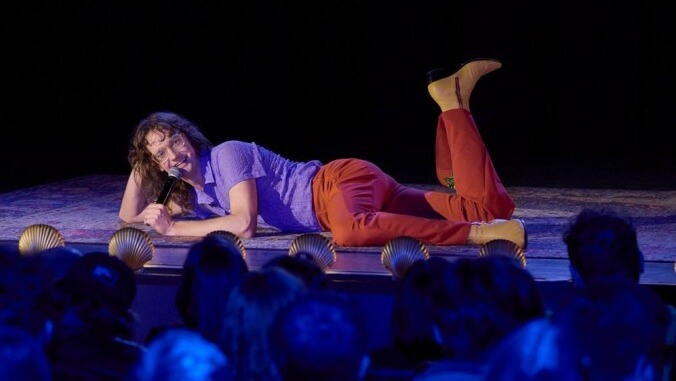Chris Fleming: HELL review: Cult comedian tiptoes into the spotlight
Fleming takes over L.A.'s Dynasty Typewriter in his stream-of-consciousness Peacock special

Chris Fleming has long been a fairly niche figure. He began uploading YouTube videos more than a decade ago, gaining attention for his series Gayle, which followed a deranged Yanni- and couscous-obsessed housewife through the trials and tribulations of her suburban Massachusetts milieu. But his esoteric style has always had at least some universality; his most famous bit probably is the oh-so-relatable “Company Is Coming.” Fleming has steadily grown a larger audience as his work has only grown more surreal. So in that sense, HELL, his special that hits Peacock on August 18, caps the alt-comedian’s deserved climb to the next echelon.
Luckily, Fleming has not jettisoned any of the flair that has made him a star among, as he says, “theater people who don’t get cast.” Taking to the stage dressed like “the woman who judges the parade,” Fleming moves through topics with lightning speed. The first five minutes alone riff on parades, Bruce Springsteen and Barack Obama’s podcast, and drivers of Nissan Cubes. The effect is pleasantly disorienting, and immediately breaks down whatever protective wall the audience had up. You don’t know where Fleming is about to take you, but you’re forced to trust him as your tour guide through, effectively, the suburban New Englander’s psyche.
A lot of comedians come from Boston; sometimes, it feels like there are more from Boston than anywhere else. But Fleming’s comedy feels distinctly, broadly Massachusetts. There are the requisite jokes about an Irish Catholic going to therapy, sure, but Fleming’s reflections on his childhood reveal the mundanities of growing up on a cul-de-sac raised by parents who went to Smith or Middlebury or Vassar. At one point, Fleming displays an image of a pair of knit coffee-table gnomes, opining, “There’s not much to say about these guys,” before launching into a several-minute episode about his aunt interrogating him on middle-school promiscuity. The connections between topics are somewhat tenuous (and may only make complete sense to Fleming) but they give the appearance of free association. And basically, we get a front-row seat to this suburban Irish-Catholic therapy session.
Much of the set’s success is owed to Fleming’s physicality. The comedian is well aware of how bizarre his own body is, offering it up for a slightly nightmarish sight gag in the opening minutes when he vocally compares himself to a horse. The horse metaphor is earned; he does prance, kind of a lot. He does momentarily fashion himself a feedbag from an audience member’s purse. But Fleming is more than a human horse (which, it must be said, is different from a centaur). In moments, his face seems to be made of pure elastic, contorting into Seuss-esque grins and the wide-eyedness of a Very Hungry Caterpillar. Fleming has the uncanny knack of making you read his face in his voice; he can communicate precisely without saying a word.






















![Rob Reiner's son booked for murder amid homicide investigation [Updated]](https://img.pastemagazine.com/wp-content/avuploads/2025/12/15131025/MixCollage-15-Dec-2025-01-10-PM-9121.jpg)

















